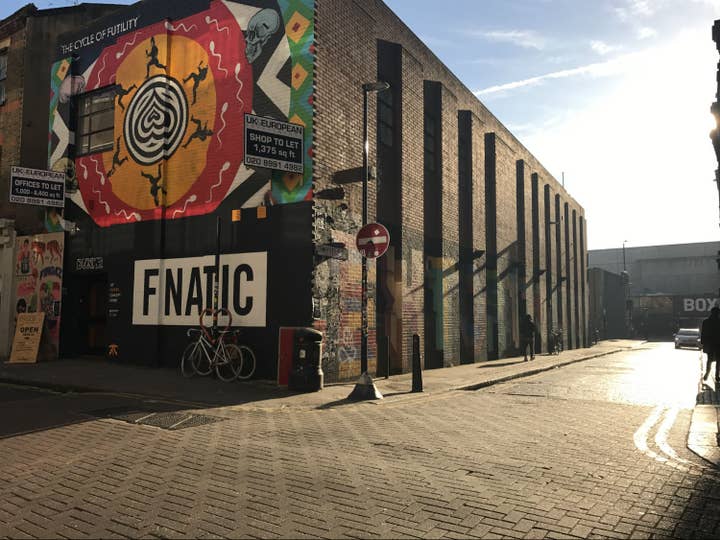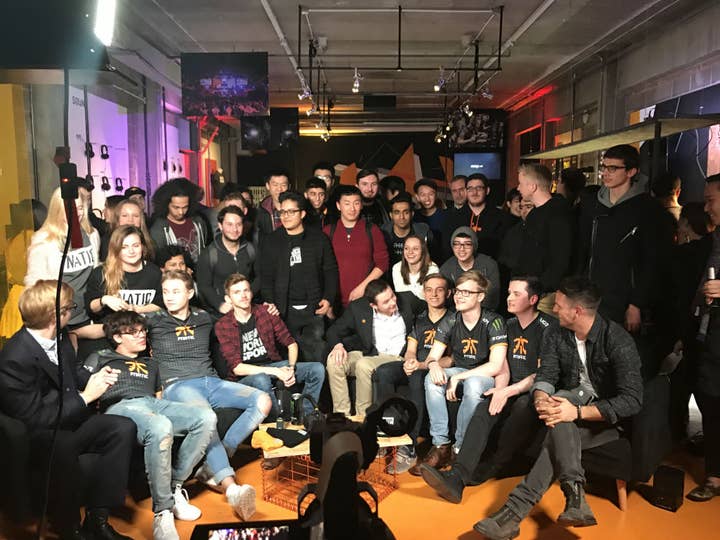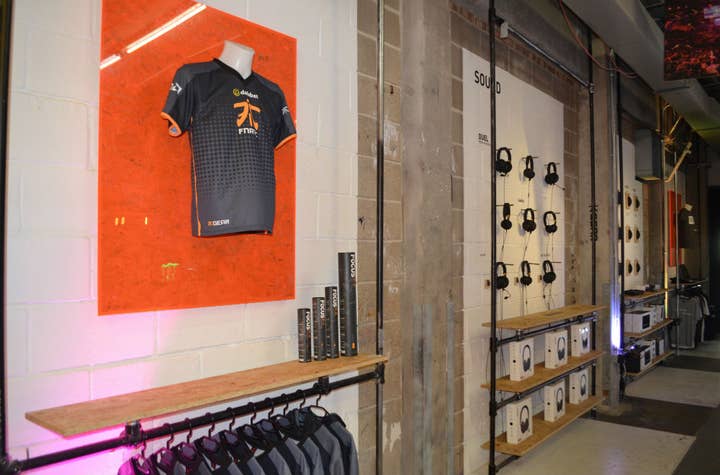Fnatic: "We opened an eSports store to prove it was possible"
The professional gaming team opened a retail outlet in London last month - and it could be a sign of things to come
Turn left out of the Bishopsgate entrance of London's Liverpool Street station and, after about ten minutes, you'll pass under an impressive white bridge into Shoreditch: a district known for its fashionable eating establishments and ongoing contemporary 'hispterfication'.
Take a right down Redchurch Street and the chaos of the capital is replaced with a much quieter, almost pedestrianised road. A boxy, brick building bears the name of an eSports team painted onto the wall, in much the same style as the large-scale graffiti throughout the area. Loud music can be heard from within and the doors are wide open, revealing a shop interior slightly obscured by those plastic flaps that usually hang from warehouse doors. So far, so Shoreditch.
This is Bunkr, the eSports concept pop-up store formed by professional gaming team Fnatic, one of the more familiar names from the world of competitive games tournaments. But what is an eSports team doing opening a physical shop?

"The idea comes from our founder Sam Matthews," the team's head of events and influencers Erik Londré tells GamesIndustry.biz. "It's a bit of a pet project for him - if only to show that it's possible. It's not like we were 100% sure it would be a massive success, but we needed to try it. And we thought it would be fun.
"[As a business] we take inspiration from Manchester United, but we also take inspiration from Vans and the things they've done with their skateboard stuff and footwear. Everybody is trying out things."
Wandering around the shop, it's appears to be an off-shoot of what some envisage the future of games retail to be. Both GAME and HMV have experimented with more interactive outlets to better engage customers. Just three miles away stands GAME's new Belong store on Wardour Street, which adds playable console, PC and VR areas to the standard racks of games waiting to be sold. Up in Manchester's Trafford Centre, the firm introduced the first Belong last year, then called the Multiplay Gaming Arena: ten gaming PCs and a virtual reality pod open for public use alongside the usual retail offering, a setup not too dissimilar to the Gamerbase stores HMV once tried.
While Bunkr is more sparsely laid out, the features are much more varied. In addition to racks of apparel and gaming accessories as well as a section based on the ESL brand, there is (perhaps predictably) a one-on-one PC gaming station clearly built for competitive events, and a DJ-style music desk at the back providing the ambience. But there's also a drinks bar, a large virtual reality corner for the HTC Vive, and a PC-and-webcam setup dedicated to livestreaming - something we're told is open for any streamer to use.
"It's not just a physical space in London, it's also a source of worldwide exposure."
Erik Londré, Fnatic
It's a unique layout, and one that feels more geared towards keeping people in the store than taking their money and churning them out. Customer turnover is clearly not a priority here.
"We were looking at another space near Old Street Station," Londré explains. "That would only have been a store, and for me that's not as interesting. To have a space that's actually multi-purpose, to be able to throw a party, host a livestream - that gives so much more life, and it's really cool."
Hence the decision to set up shop on what Londré describes as a "hip retail street" in East London. Bunkr has not been designed as just another new revenue stream, it's the opportunity to display not only what Fnatic does but the world it inhabits to a different audience. Photos from tournaments hang above the merchandise and hefty silver trophies stand proudly behind the bar.
"It's about showing eSports and gaming as cool, and I think people are reacting to that," says Londré. "We don't want to hear more people asking 'oh, is it really a sport?' or - the worst one - 'so you mean people watch you play computer games'? We just show them that picture up there from Katowice last year. 15,000 people in an arena, between 500,000 and one million on the streams - yeah, people watch this."

The questions Londré tires of are ones increasingly being asked by the wider games market, now finally recognising that what may seem like a niche has become a fully-fledged, thriving industry of its own - and one that could become an important ambassador for video games as a medium to the mainstream. Londré posits that, as widespread understanding of games and their mechanics grows, watching teams like Fnatic in competitions will appeal on the same level as traditional sports.
"Okay, we're not going to be as big as football," he admits, "but we can be as big as basketball. More people in ten, twenty years will be able to relate to a person playing computer games - it's already more relatable than somebody playing ice hockey. How many people have ever stood on an ice rink? I'm from Sweden and I've only done it four or five times in my life."
"You can give fans an experience they would never think they could have - that's something you can do with a physical space."
Erik Londré, Fnatic
Again, stores such as Bunkr can serve a purpose here by bringing those eSports competitions (albeit on a smaller scale) to people's doorsteps. Not only will this help demonstrate the concept of professional gaming, it also allows Fnatic to reach out to its a fans in a way that the larger tournaments just don't allow. The store has only been open for a month and already the team has hosted multiple community events, with another tournament planned for this coming weekend. The organisation even used the space to announce its player line-up for the upcoming League of Legends championships. Who knows, perhaps a future eSports star was in the audience?
"It's so cool to meet fans, to give people first-hand experiences with the team, like when we had all of the League of Legends team here," says Londré. "You can give fans an experience they would never think they could have - that's something you can do with a physical space.
"It's hard to do at events, because there's all the chaos... whereas here, we had 50 to 60 people watching us announce the new League team live - and they're there, in front of them. People were following this event from all over the world via livestream, but those fans are there physically in the room with them.
"I think people get a closer connection to Fnatic through the people that work here in the store, they get to know them, they get a stronger bond with Fnatic. That always happens when we host booths in the arenas - you always end up getting a bunch of kids hanging out in your booth because they want to be a part of it."

That connection also stems from the fact that it really is Fnatic staff manning the shop. The logistics of running pop-up stores is often outsourced to experienced retailers - the Xbox One shop that was temporarily located just around the corner in Shoreditch's Boxpark was actually operated by GAME. However, with Bunkr, Londré stresses that the whole team has been "very hands-on" - founder Sam Matthews was even spraypainting metal poles until 3am ahead of the store's launch.
But operating a bricks-and-mortar retail business is presumably a massive step out of Fnatic's comfort zone. The organisation is, after all, primarily concerned with winning those big, shiny trophies. Why not bring in a retailer to handle the day-to-day goings on at Bunkr on Fnatic's behalf?
"I don't think we'd trust any," laughs Londré. "We're a start-up, we want to find our way, control how we look, how we present ourselves, and also learn stuff ourselves. We also wanted to make a statement with this store. It's a step towards where we want to be."
Running a physical store also ties in with Fnatic's business better than you might think. Everything stocked at Bunkr is already sold by the organisation online. Fans want to be able to buy the same keyboards, mice and headsets their favourite players use, perhaps as a step towards their own pro-gaming careers, while Londré reveals that its clothing range is "big business". This can also be seen in the store's layout - the first item you see on entering Bunkr is the Fnatic team shirt, mounted as prominently as any football kit.
"Apparel is an essential part of running an eSports team. That side of the business has to work for the rest to work."
Erik Londré, Fnatic
"That is our number one seller," Londré says, pointing to the item. "Apparel is an essential part of running an eSports team. That side of the business has to work for the rest to work.
"We are still first and foremost an eSports team, of course. The success of our teams is what we live on, that's our very core, that's who we are. But as I said we like to experiment with what else we can throw into the mix."
Seeing the Fnatic shirt displayed so proudly brings other retail outlets to mind. The UK's Premier League football clubs have merchandise stores in towns and shopping centres far from their home grounds - it's not too difficult to imagine other eSports teams opening their own branches around the world.
"[That will happen] eventually, of course," says Londré. "For now, I think our fans are willing to travel for a store like this. And I don't know if I'd want to have a store in a mall. I'd prefer a nice street, with smaller boutiques and shops. But of course, I think definitely that will happen in the future.
"We are definitely doing more. We're such a global brand, we have teams from southeast Asia to California and everywhere in between. Physical spaces is a bit of an experiment and the next one might be in Berlin, or Los Angeles, or somewhere else.
"It's not just a store, it's part of a bigger plan and bigger goals. We've done it ourselves this time. Maybe next time, if we opened a store in Los Angeles, maybe we'd send in-store pictures and work with someone else. That could be done, but for the first we wanted to do it ourselves."

"I would love to see this become the physical centre of eSports and gaming events. If you're launching your new mobile MOBA, I want this to be the obvious place to do that in London."
Erik Londré, Fnatic
And the events manager is understandably keen to see Bunkr host more events, not just with the Fnatic fanbase but for the eSports community and wider games industry at large.
"I would love to see this become the physical centre of eSports and gaming events," he says. "If you're launching your new mobile MOBA, I want this to be the obvious place to do that in London. The plan is that big space [beyond the back of the store] will become our office, and we will share it with ESL UK probably. That's the plan. People love this space, and we want to keep it - but it's not free to be in Shoreditch."
Even so, what once began as a pop-up shop and Matthews' pet project has already seen its life extended. After only four weeks, Bunkr's expiry date has been shifted from "before Christmas" to "some time in January" to "we'll see".
"We're in talks about that," says Londré. "What we need to do is give it a stronger identity of its own, not just be a Fnatic shop but be Bunkr. If you have any young eSports entrepreneurs among your readers that likes to work with a physical space in London, they can get in touch."
Londré brings the conversation back to that League of Legends announcement, detailing the team it plans to take to the next championship. The event was a prime example of why an eSports team having a retail location to play with can mean more than a few extra shirt sales. While the Shoreditch outlet was packed with dozens of fans, many thousands more watched via the livestream broadcast from that unobtrusive computer station in the far corner of the room.
"The content we have been getting out of Bunkr has been seen in 200 countries," Londré reveals. "Yes, it's a physical space in London, but it's also a source of worldwide exposure. What we want is to have every Fnatic fan around the world wanting to visit Bunkr - even online. It's not just about who came to the party, it's about who saw the pictures."
